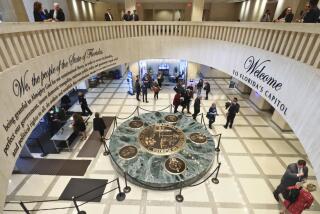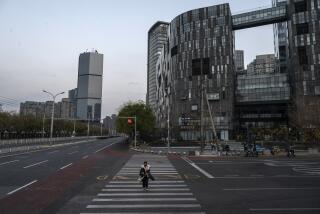Chinese Cities Opening Up to Country’s Elite
- Share via
SHANGHAI — For six years after he moved to Shanghai, Huang Henghui lived like an illegal immigrant in his own country, hopping from job to job with no benefits and facing the constant threat that he would be sent back to his dead-end town in China’s hinterlands.
He was one of the 3 million migrants who are allowed to work here temporarily, helping to build Shanghai’s hallmark skyscrapers and highways and restore its role as China’s wealthiest and most dynamic metropolis.
Even with 14 million “members,” the city can be considered among China’s most exclusive clubs: One must be born here to belong. Yet as desirable a place to live as Shanghai is, without a coveted residence permit, or hukou, outsiders like Huang can’t settle permanently, marry or send their children to the city’s free public schools. Even in the graveyard, it’s Shanghai residents only.
However, thanks to new rules designed to reunite split families and attract the cream of China’s vast crop, the city gates have opened just a crack. Now, with money or merit, it is possible for a select few to become permanent residents and share in Shanghai’s wealth and welfare.
In January, along with the new $20,000 apartment he bought on the outskirts of Shanghai, Huang got the key to the city: his hukou.
“My hometown is stagnant. There’s no change and no challenge,” the 26-year-old said as he moved furniture into his new home. “But Shanghai is changing every day. It drives you to take risks, and if you work hard, you can have a better life.”
Even more important, he said, he can have a wife. In the past, he would have had to choose between staying in Shanghai or marrying his fiancee in Jiangxi province. Under the new rules, which allow him an extra hukou for the household, he can do both.
Ever since Emperor Qin Shihuang divided the country into small, centrally controlled districts and created the Great Wall more than 2,000 years ago, China’s leaders have sought to manage the vast population.
The hukou system was established by Communist leader Mao Tse-tung in 1958 to bind farmers to their land and close the doors to the migrant masses seeking a better life in the cities.
In the era of a planned economy, one had to present a local hukou to receive an apartment, job and food--even cooking oil and cigarettes. It is still necessary for gaining a pension, housing and insurance.
“Without a hukou, you could not survive,” said Ding Jinghong, a professor of population studies in Shanghai. “It kept you in your hometown like an anchor.”
Or a ball and chain. As the economy opened up during the last 20 years and people began to rely on the market, not the state, for their essentials, the hukou was transformed from necessity to nuisance.
With more and more people leaving their homes in search of better jobs, the hukou came to mean split families, lost job opportunities and missed marriages.
Mao designed the system to ensure social stability, but his other policies caused serious divisions.
During the 1966-76 Cultural Revolution, Mao ordered legions of students and professionals to leave the cities and work alongside the peasants in the countryside--creating a generation of rural people whose relations and ambitions lay beyond the boundaries of their hometowns.
Huang’s new hukou bridges one of those gaps. His mother was sent to labor in Jiangxi province in the 1960s, and her hukou was transferred with her. She married a farmer there and had three sons. She was not allowed to reclaim her residency here until the mid-1980s, when Shanghai became the first city to allow former residents to come home.
Her husband and children, though, had to stay behind in Jiangxi, bound by their hukou to the place where they were born.
In the following decade, one by one, Huang and his two brothers followed her to the city, taking odd jobs and hoping that the government eventually would allow them permanent residency.
In September, China’s State Council urged local governments to reunite families split by the system, to allow children to receive a hukou through either parent at birth instead of inheriting residency just through the mother, and to permit aging parents to live with urban offspring.
Though these reforms have yet to be implemented, some larger cities are offering their own incentives.
Guangzhou, the capital of Guangdong province, which depends on migrant laborers to fill its factories, now grants citizenship after a seven-year stay. Fujian province will give a hukou immediately with a $30,000 investment in property or a business.
Shanghai has gone further. Faced with a declining birthrate and a growing need for professionals, the city now grants residency to big investors, top university graduates, some Chinese employees of foreign corporations and people of “great talent.” To populate the still-sparse Pudong New Area, the city’s new financial district, which has sprouted from farmland in the last five years, those who buy Pudong property also can qualify for a hukou.
“Our goal is to attract first-class people,” said Shen Jian, an official at Pudong’s Land and Planning Bureau.
“But there are also restrictions on ‘not very useful people,’ ” she said, using a government euphemism for uneducated manual laborers. “If the door was wide open, everyone would come rushing in.”
The Pudong hukou became available in 1996, but officials this year lowered from $36,000 to $24,000 the minimum amount people had to spend on downtown property to qualify.
To make sure that the new citizens are “the right kind of people,” Shen said, they receive a temporary hukou with a blue stamp--permanent residents have red ones--and are placed on three years’ probation. So far, about 1,900 people have received a blue seal.
Tai Huguo, an accountant, is one of them. His hometown, in a region of northern China occupied by the Japanese during World War II, is one of the most depressed areas in the country. So he took a chance and came to Shanghai, where his ability to speak Japanese is a desirable skill.
“There’s no comparison between Shanghai and my hometown,” said Tai, 32, who just received a hukou through Hitachi, his employer. “When I told my relatives at home what my salary was, they couldn’t believe it. It is 10 times what they make.
Until Tai became a Shanghai resident, he had to pay high tuition fees here for his children that are beyond the reach of most newcomers--equal to almost half a year’s worth of his old hometown wages. Yet educating and integrating the children of new migrants is the key step to elevating the level of a society, said Ford Foundation researcher Stephen McGurk, who is tracking the issue.
“There’s only so much you can do to improve a population of adults,” McGurk said. “It’s the kids of the migrants who will help the cities achieve their vision of a modern society.”
With the unceasing move toward urbanization, is it possible that the government will lift controls completely?
“With a population of 1.2 billion people, it’s unimaginable that China will get rid of the hukou system,” said Shanghai Academy of Social Sciences professor Wang Lijuan, who piloted a government study on how to reform the system. “It’s too useful for social control and tracking births, deaths and marriages.
“I do think the government will open one door after another to let different groups into the city,” Wang said. “Someday, the hukou may be nothing more than an ID card.”
More to Read
Sign up for Essential California
The most important California stories and recommendations in your inbox every morning.
You may occasionally receive promotional content from the Los Angeles Times.













